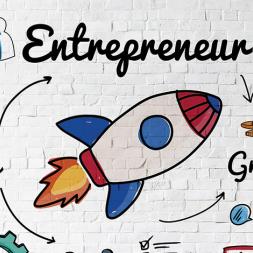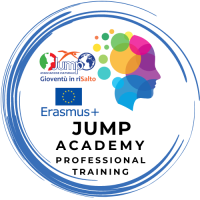
ENTREPRENEURSHIP / FINANCIAL EDUCATION. Building Sustainability From Schools To The Labor Market
Teachers starting from middle school can develop a progressive program of business education teaching with students at secondary grade a level of understanding and practice which can be the key for the future professional development of the new generation of workers in general and in specific of the new workforce of the business sectors.
Description
“Entrepreneurship in Education is about inspiring entrepreneurial potential. People need the mindset, skills, and knowledge to generate creative ideas, and the entrepreneurial initiative to turn those ideas into action“.
This is the definition of the European Commission given to explain the theoretical framework and the necessary link between the school systems and the European labor market. (Source: http://ec.europa.eu/education/policy/strategicframework/entrepreneurship_it).
Other sources are also important points of reference, such as
“Entrepreneurship Education: Enabling Teachers as a Critical Success Factor”.
“Teaching Toolkit for Entrepreneurship Education”.
Besides this, we are also always doing research and developing our materials.
JUMP in 2016 started an international cooperation partnership for a KA2 Erasmus Plus project titled “SO-VET. Social entrepreneurship as an alternative for young unemployed” which gave as result a long term training course for potential social entrepreneurs on social business. The course is still online for free and it can be attended in several languages.
After this important experience, JUMP developed an Erasmus project titled “Cultural Studies in Business” in the field of university exploring how cultural studies can cross and improve the actual business studies. The project results are very actual and useful, especially the proposed innovative Master Degree curriculum titled “Cultural Studies in Business”.
Furthermore, JUMP is the leader of another Erasmus project to create a business culture among youths and is about to start a new project on Circular Economy.
The team of trainers and project developers gained experience in the field of “Entrepreneurship education” also called “financial education” researching the very actual trends of studies but also being concrete involved in the business, administration, and project management. The team is expert in entrepreneurship and is continuously developing methods and making practical activities for different beneficiaries to help and support the existence of a “culture of entrepreneurship”.
Teachers starting from middle school can develop a progressive program of business education teaching with students at secondary grade a level of understanding and practice which can be the key for the future professional development of the new generation of workers in general and in specific of the new workforce of the business sectors. Developing a business is not something far from what can be done at school, starting from children and going on until the end of secondary school. Teachers, parents, and students have to develop entrepreneurial skills and work together in synergy acting as “potential entrepreneurs”: networking, creating a long-term vision, innovating, and training minds to use “divergent thinking’ .
This training is pure innovation and is challenging because it can be for different kinds of learners: teachers, “company staff members”, coaches and educators in general. Why is this training also for schools? According to our point of view, company staff members can also be teachers, school directors but also students and university students but we don’t believe that schools are like private companies. This doesn’t mean that schools can empower the skills and competencies of the team members like in the private sector.
As a small company in a local context, schools are at the center of a potential “business development plan” and this training will foster the growth of those competencies useful to improve a situation of poverty and lower development to a better one, also based on links with the labor market and with a local business. Potentially, schools can become cooperatives, social companies, and small and medium businesses at the local level thanks to a component which makes schools more powerful than what we imagine. What’s that? Creativity! JUMP training is conducted by experts in the different fields and can be also tailored according to partners’ needs and specific KA1 project’s aims.
Learning objectives
- Developing a wide understanding of Entrepreneurship education, the EU framework, institutional documents and guidelines and its role in the school system
- Strengthening relevant skills for an Entrepreneurial teacher to be shared with students
- Discovering existing projects and available tools in this field to foster entrepreneurship and financial education at school
- Learning to create educational activities, lesson plans and business/entrepreneurial projects at school
- Developing the ability to discover new trends in education and introduce them to students fostering creativity and critical thinking
Methodology & assessment
Furthermore, in line with the JUMP Academy method, our courses are based on a strategic balance between formal and non-formal education, indoor and outdoor education and the team takes care of a very important aspect of international mobility which is the intercultural learning which we develop with short excursions and facilitating the interaction with local partners, businesses and citizens of our territory. Each local context has its own economy so it’s always useful, in training programs, to get in contact with concrete examples (experiential learning and real based learning).
We always try to connect our learners to local teachers and students to cooperate in developing innovation and networking for future projects.
Materials, digital tools & other learning resources
JUMP provides, after the completion of the course, all presentations, training materials and any other digital and learning tools used during the training sessions. Furthermore, extra materials are sent if there are updates and new ones researched afterwards.
Certification details
At the end of the training, JUMP delivers a formal certificate of attendance and the team is at disposal to fill the Europass certification document according to the EU model template and other needed documents for reporting of the sending institution.
Our courses are in line with the Erasmus+ Quality standards for courses under Key Action 1 (learning mobility of individuals)
Pricing, packages and other information
-
Course package content:
In the course fee are included: organization, administration, trainers' costs and classes, further training/learning materials, certification, support of the team H24, photo-video reporting.
Extra costs are referred to logistics. JUMP is sending all the precise info when the participants or the Erasmus coordinator ask for information.
-
Additional information:Description of the services and activities included in the course package (such as accommodation, meals, transport) or available at extra cost.
-
Cancellation & changes:
With a proper time in advance is possible to cancel the participation, informing and explaining the motivation.
-
Additional information:The options and conditions for change and cancellation, and the policy in case of unforeseen circumstances (force majeure).
Additional information
-
Language:English
-
Target audience ISCED:Lower secondary education (ISCED 2)Upper secondary education (ISCED 3)Post-secondary non-tertiary education (ISCED 4)
-
Target audience type:Careers CouncillorHead Teacher / PrincipalCompany staff
-
Learning time:25 hours or more
Upcoming sessions
Past sessions
More courses by this organiser

COMMUNICATION IN THE NEW MULTICULTURAL SOCIETY. Understanding How Language Works To Improve Our Communication And Relationships With Others

ONLINE TEACHING – GAMIFICATION&GAME BASED LEARNING - upporting teachers to face the new frontiers of the digital transformation


